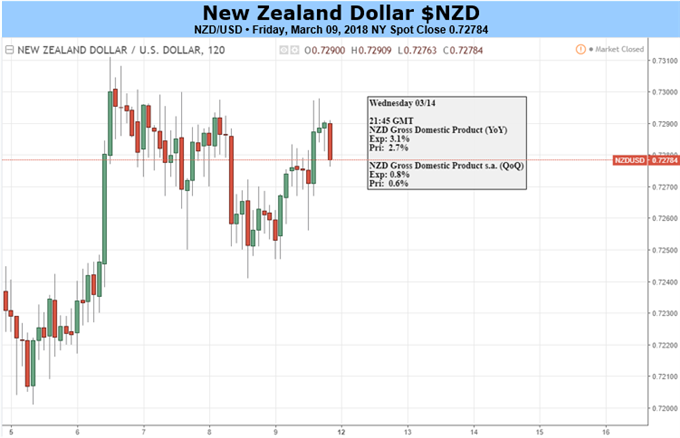
New Zealand Dollar Fundamental Forecast: Neutral
Talking Points:
- New Zealand Dollar was exposed to US tariff signing and North Korea denuclearization
- The currency will be facing a local GDP release in which the RBNZ has high hopes for
- On the external front, next week also brings US CPI and ongoing trade developments
Have a question about what’s in store for New Zealand Dollar next week? Join a DailyFX Trading Q&A Webinar to ask it live!
A lack of key economic news flow from home meant that the New Zealand Dollar was exposed to external factors this past week. In particular, on US protectionism and North Korean developments which stirred sentiment in the markets. The former concluded with Donald Trump signing his tariff proposals while excluding neighboring countries. The latter promised to refrain from conducting more missile tests.
Next week looks to be like a similar scenario for the Kiwi Dollar, but with the addition of risks from home. New Zealand’s fourth quarter GDP is due on Wednesday. Growth is expected to increase to 3.1% y/y from 2.7% in the third quarter. Such an outcome would mean the fastest pace of expansion since 2016. The RBNZ seems to have high hopes for this when it mentioned that growth was expected to strengthen going forward.
But before this data crosses the wires, we will receive the US CPI report on Tuesday. The headline inflation rate is expected to tick up to 2.2% y/y from 2.1%. The core rate on the other hand is expected to remain unchanged at 1.8%. If a surprise to the upside further firms Fed rate hike bets, the New Zealand Dollar’s appeal could be undermined as it becomes more evident that it will lose its yield advantage to the greenback.
Outside of economic data releases, Kiwi Dollar traders should keep an eye out for news that are related to Mr. Trump’s tariff proposals. Actions ranging from countries retaliating to the possibility of more being exempt could stoke volatility in the sentiment-linked unit.
What could even be underpriced in the markets is the potential for Italian political risk. The country was left with a hung parliament after a general election in which the eurosceptic Five Star Movement was left with the most votes for a single party. News that a majority government forms with the anti-euro party could induce risk aversion. Taking these things into consideration, on balance this points to a neutral forecast.
New Zealand Dollar Trading Resources:
- Just getting started? See our beginners’ guide for FX traders
- Having trouble with your strategy? Here’s the #1 mistake that traders make




